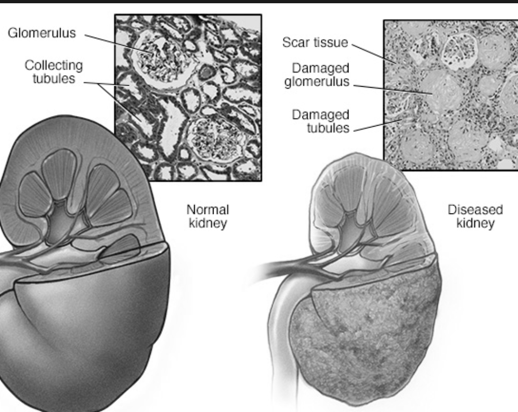Causes
Kidney disease causes the tiny filters in the kidneys (called nephrons) to lose their ability to filter. Damage to the nephrons may occur suddenly after an injury or poisoning. But, many kidney diseases take years or even decades to cause damage that is noticeable.
The two most commons causes are:
- Diabetes —high blood sugar can damage nephrons
- High blood pressure —severe high blood pressure can damage blood vessels in the kidneys
Others causes include:
- Pyelonephritis
- Glomerulonephritis
- Polycystic kidney disease
- Birth defects
- Bilateral renal artery stenosis
- Poisoning
- Severe trauma
- Viral infections (eg, hepatitis B , hepatitis C , HIV/AIDS )
- Long-term use of medicines that contain aspirin , acetaminophen , ibuprofen
- Abnormal build-up of substances within the kidneys (eg, amyloidosis , protein build-up)
- Toxic reaction to drugs or x-ray dyes
- Systemic diseases (eg, lupus , polyarteritis , Wegener’s granulomatosis
- Conditions that severely decrease the amount of blood (eg, burns , pancreatitis , peritonitis )
- Conditions that make it difficult to urinate (eg, enlarged prostate , kidney stones , tumors)
Renal Failure

Risk Factors
These factors increase your chance of developing kidney failure. Tell your doctor if you have any of these risk factors:
- Diabetes
- Genetics: polycystic kidney disease , type 1 diabetes
- Race: African Americans
- High blood pressure
- Lupus or other autoimmune diseases
- Long-term use of pain medications containing aspirin or nonsteroidal anti-inflammatory drugs (NSAIDs) in high doses
- Liver failure, jaundice
- Respiratory failure
- HIV
- Cancer
- Recent open heart surgery
- Recent surgery on an abdominal aortic aneurysm
- Condition that obstructs urine flow
- Enlargement of the prostate gland
Please be aware that this information is provided to supplement the care provided by your physician. It is neither intended nor implied to be a substitute for professional medical advice. CALL YOUR HEALTHCARE PROVIDER IMMEDIATELY IF YOU THINK YOU MAY HAVE A MEDICAL EMERGENCY. Always seek the advice of your physician or other qualified health provider prior to starting any new treatment or with any questions you may have regarding a medical condition. Copyright © 2024 EBSCO Publishing All rights reserved.




